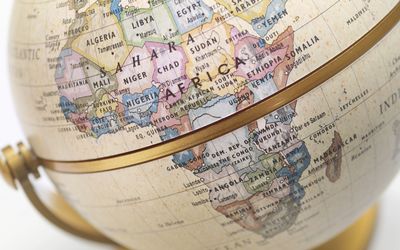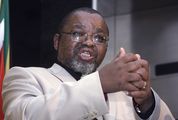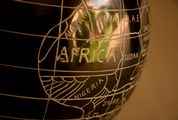SA’s ignorance of Africa does everyone a disservice
by George Rautenbach,
2016-03-15 06:16:50.0
RECENTLY Cape Town hosted the first Bloomberg Africa Business and Economic Summit. The presentations focused on the validity in the argument that Africa is booming. While it certainly was worth the effort to attend, I was surprised and perplexed at our ignorance as South Africans of the world in general and our continent in particular. This was reflected throughout the summit.
Why was this event important and what can be learned from it? Strangely enough we can draw conclusions from both the content and the absence of content. A summit that was supposed to answer many questions turned out to raise more questions instead.
The noble idea was quite well orchestrated with the obligatory American fanfare so familiar from their political campaigns, as one would expect from Bloomberg. We cannot blame Americans for living their culture. The problem lies with us South Africans. It was disheartening to see so many white faces in the audience even today, and the black ones were mainly from Nigeria and Kenya. Apart from the limited participation, discussions by the panellists gave the impression that sub-Saharan Africa consists mainly of Nigeria, Kenya, SA and to a lesser extent Botswana and Rwanda.
The discussions gave some insight into how business is doing in Africa, albeit from a statistical point of view that we all know can be manipulated to suit the audience. In sum the summit boiled down to the "African narrative" being at a pause or "lull" in what was earlier perceived to be the continent’s boom time.
The subjects ranged from the continent’s challenges and future perspectives to the influence of demographics on aspects of economic growth.
According to International Monetary Fund (IMF) projections for 2016 and 2017, overall sub-Saharan Africa is growing much faster than the US, Europe, Japan, the Middle East, North Africa, Latin America and the Caribbean.
In all of this SA, in terms of its trade policies with Africa, remains an enigma. Perhaps it is the only country that does not take growth in Africa seriously or in simple terms does not want to do business with Africa. Only about 15% of our total trade is with the rest of Africa.
Other countries, especially those that are traditional partners of SA, don’t think this way; for them the continent merits far more attention. The French parliament established a special committee in 2014 to re-evaluate its relationship with Africa, concluding that it is the new Eldorado of the world.
The European Union (EU) is channeling most of its development aid to Africa, and we know development aid is a political tool that opens doors. The US established the African Growth and Opportunity Act, while China is all over the continent to the frustration of many. SA remains largely absent, has no strategy and no well-defined vision for its relationship with the continent.
Let us look at how interests in Africa play out in real life. From own experience France will serve as a perfect example of how government and business should work together. In 2011 France made an enormous contribution to peace and stability in the Ivory Coast. The rightful democratically elected president was inaugurated as head of state after a short civil war. Nicolas Sarkozy, at the time president of France, came in person to the inauguration of President Alassane Dramane Ouattara. His entourage included the CEOs of Bolloré, Orange and Bouygues. These companies need no introduction in the business world, as they are some of the wealthiest in France. From that visit alone France walked away with €2.9bn in contracts over a period of 15 years. The French have a strategy and vision.
In comparison, how does SA think and feel about the continent? The commissioner of SA’s Competition Commission, Tembinkosi Bonakele, during the summit hinted at the fact that business in SA is still very much owned by a few white privileged families. During the apartheid era the world isolated SA and SA could not do business in Africa. This suited the interests of many Western countries. At the end of apartheid, there was speculation internationally that this "new kid on the block" could pose problems for Western business interests on the continent. Some countries approached SA’s foreign missions and "offered assistance". The broader aim was to gain insights into SA’s business interests on the continent.
A few South African companies ventured into Africa and burned their fingers, mainly due to ignorance of the complexities of African culture: the role of respect, the role of relationships, and how a humble approach can make friends for a life time. Many South Africans are viewed in Africa as arrogant and paternalistic. We now do some business with Africa but in a very limited way under the pretext of "consolidation", "focus" and "economically unstable". It is nothing but fear of diversity and an arrogance that we "know" Africa. Self-inflicted isolation.
We played ourselves out of the equation and the rest of the world enjoys watching SA isolating itself from the continent, SA no longer poses a threat to traditional interests in Africa. We need to be critical and ask: does SA have a strategy where we know what we would like to achieve during, for example, a state visit? The answer is simple: no, we don’t, people tend to go along as it is either expected or they are curious about their continent. Very little economic benefit is derived from co-operation between the government and the private sector.
In the final analysis it is clear that SA does not attach the same importance to Africa as the rest of the world. SA is happy to do business with traditional partners even though sub-Saharan Africa, according to the IMF, is one of the fastest-growing regions, behind China, India and south-east Asia. This means that the sad state of our internal political situation, which is driven by suspicions and unfounded fears, is playing out in our foreign policy.
About 85% of SA’s imports and exports are directed towards the rest of the world. We are based on the African continent and while the EU, the US and China are making enormous efforts to invest in Africa and work on the continent, SA is mostly absent.
To sum it up we do not trust our own much less the continent. SA should be at the leading edge of summits and conferences about the continent. SA should be a gateway, a knowledge base for those interested in the continent. Others should come and learn from us, but in fact we know very little about our own continent.
In this context it is not surprising that it takes a US entity such as Bloomberg to discuss Africa as a whole in Cape Town. More conferences about Africa are held outside the continent than inside the continent. A quick look at the agenda of international conferences and seminars in SA on Africa makes one realise that we fail the continent dismally. Africa does not appear to be an interesting continent, at least not from a South African perspective. Our future lies with the continent, so perhaps we should start acting that way.
• Rautenbach, a former chief of staff at the United Nations, is the CEO of Africa Business Experts

Picture: THINKSTOCK
RECENTLY Cape Town hosted the first Bloomberg Africa Business and Economic Summit. The presentations focused on the validity in the argument that Africa is booming. While it certainly was worth the effort to attend, I was surprised and perplexed at our ignorance as South Africans of the world in general and our continent in particular. This was reflected throughout the summit.
Why was this event important and what can be learned from it? Strangely enough we can draw conclusions from both the content and the absence of content. A summit that was supposed to answer many questions turned out to raise more questions instead.
The noble idea was quite well orchestrated with the obligatory American fanfare so familiar from their political campaigns, as one would expect from Bloomberg. We cannot blame Americans for living their culture. The problem lies with us South Africans. It was disheartening to see so many white faces in the audience even today, and the black ones were mainly from Nigeria and Kenya. Apart from the limited participation, discussions by the panellists gave the impression that sub-Saharan Africa consists mainly of Nigeria, Kenya, SA and to a lesser extent Botswana and Rwanda.
The discussions gave some insight into how business is doing in Africa, albeit from a statistical point of view that we all know can be manipulated to suit the audience. In sum the summit boiled down to the "African narrative" being at a pause or "lull" in what was earlier perceived to be the continent’s boom time.
The subjects ranged from the continent’s challenges and future perspectives to the influence of demographics on aspects of economic growth.
According to International Monetary Fund (IMF) projections for 2016 and 2017, overall sub-Saharan Africa is growing much faster than the US, Europe, Japan, the Middle East, North Africa, Latin America and the Caribbean.
In all of this SA, in terms of its trade policies with Africa, remains an enigma. Perhaps it is the only country that does not take growth in Africa seriously or in simple terms does not want to do business with Africa. Only about 15% of our total trade is with the rest of Africa.
Other countries, especially those that are traditional partners of SA, don’t think this way; for them the continent merits far more attention. The French parliament established a special committee in 2014 to re-evaluate its relationship with Africa, concluding that it is the new Eldorado of the world.
The European Union (EU) is channeling most of its development aid to Africa, and we know development aid is a political tool that opens doors. The US established the African Growth and Opportunity Act, while China is all over the continent to the frustration of many. SA remains largely absent, has no strategy and no well-defined vision for its relationship with the continent.
Let us look at how interests in Africa play out in real life. From own experience France will serve as a perfect example of how government and business should work together. In 2011 France made an enormous contribution to peace and stability in the Ivory Coast. The rightful democratically elected president was inaugurated as head of state after a short civil war. Nicolas Sarkozy, at the time president of France, came in person to the inauguration of President Alassane Dramane Ouattara. His entourage included the CEOs of Bolloré, Orange and Bouygues. These companies need no introduction in the business world, as they are some of the wealthiest in France. From that visit alone France walked away with €2.9bn in contracts over a period of 15 years. The French have a strategy and vision.
In comparison, how does SA think and feel about the continent? The commissioner of SA’s Competition Commission, Tembinkosi Bonakele, during the summit hinted at the fact that business in SA is still very much owned by a few white privileged families. During the apartheid era the world isolated SA and SA could not do business in Africa. This suited the interests of many Western countries. At the end of apartheid, there was speculation internationally that this "new kid on the block" could pose problems for Western business interests on the continent. Some countries approached SA’s foreign missions and "offered assistance". The broader aim was to gain insights into SA’s business interests on the continent.
A few South African companies ventured into Africa and burned their fingers, mainly due to ignorance of the complexities of African culture: the role of respect, the role of relationships, and how a humble approach can make friends for a life time. Many South Africans are viewed in Africa as arrogant and paternalistic. We now do some business with Africa but in a very limited way under the pretext of "consolidation", "focus" and "economically unstable". It is nothing but fear of diversity and an arrogance that we "know" Africa. Self-inflicted isolation.
We played ourselves out of the equation and the rest of the world enjoys watching SA isolating itself from the continent, SA no longer poses a threat to traditional interests in Africa. We need to be critical and ask: does SA have a strategy where we know what we would like to achieve during, for example, a state visit? The answer is simple: no, we don’t, people tend to go along as it is either expected or they are curious about their continent. Very little economic benefit is derived from co-operation between the government and the private sector.
In the final analysis it is clear that SA does not attach the same importance to Africa as the rest of the world. SA is happy to do business with traditional partners even though sub-Saharan Africa, according to the IMF, is one of the fastest-growing regions, behind China, India and south-east Asia. This means that the sad state of our internal political situation, which is driven by suspicions and unfounded fears, is playing out in our foreign policy.
About 85% of SA’s imports and exports are directed towards the rest of the world. We are based on the African continent and while the EU, the US and China are making enormous efforts to invest in Africa and work on the continent, SA is mostly absent.
To sum it up we do not trust our own much less the continent. SA should be at the leading edge of summits and conferences about the continent. SA should be a gateway, a knowledge base for those interested in the continent. Others should come and learn from us, but in fact we know very little about our own continent.
In this context it is not surprising that it takes a US entity such as Bloomberg to discuss Africa as a whole in Cape Town. More conferences about Africa are held outside the continent than inside the continent. A quick look at the agenda of international conferences and seminars in SA on Africa makes one realise that we fail the continent dismally. Africa does not appear to be an interesting continent, at least not from a South African perspective. Our future lies with the continent, so perhaps we should start acting that way.
• Rautenbach, a former chief of staff at the United Nations, is the CEO of Africa Business Experts
























Change: 0.83%
Change: 0.93%
Change: 0.95%
Change: 0.73%
Change: 1.91%
Data supplied by Profile Data
Change: 0.58%
Change: 0.43%
Change: 0.83%
Change: 0.00%
Change: 0.56%
Data supplied by Profile Data
Change: 0.08%
Change: 0.06%
Change: 0.10%
Change: -0.07%
Change: -0.12%
Data supplied by Profile Data
Change: -0.25%
Change: -0.10%
Change: -0.19%
Change: -0.34%
Change: 0.17%
Data supplied by Profile Data